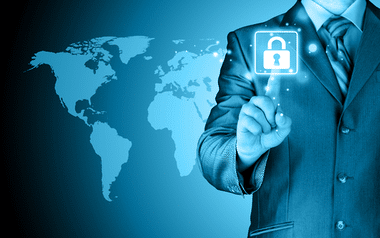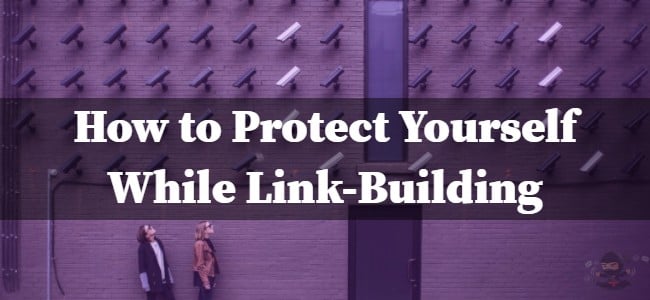Link building is a highly useful pursuit and an essential weapon in any online marketer’s arsenal.
Search engines use your link network in order to determine your website’s ranking, so being tactical about the quality and authority of the sites you associate with is important to success.
However, there’s a frequently overlooked factor that is also crucial to consider when creating a successful link-building campaign: sloppy security practices can severely tarnish your reputation with both search engines and potential customers.
There are several instances when failing to secure yourself could result in a disastrous infiltration or infection, so it’s wise to do all you can in order to stay safe.
This article will provide you with practical advice on how to protect yourself during each stage of your seo link building campaign.

Security Matters
As the online landscape is constantly developing, cybersecurity continues to be one of the most talked about elements of our modern world. Attacks are increasing in frequency and concerns about staying safe has gripped the general public.
This means ensuring a clean, secure and stringently-managed business is essential to receive trust from potential clients and customers.
Unfortunately, all marketers have to understand that we’re now in a place where even the most simple malvertising injection could destroy your audience’s trust in your brand.
Similarly, the Google algorithm has been specifically tuned to take into account the trustworthiness of your affiliate websites.
It also takes under consideration any evidence of spam in your network.
We’re now at a place where it’s pointless to put the effort into a comprehensive link-building campaign if you fail to take the correct steps to stay safe.
These following baseline points are essential to consider before you start your marketing endeavor.
Covering The Basics
Poor personal cyber-security practices can be the most common reason for online marketing campaigns being brought down by malware.
If you fail to properly protect the machine from which you most regularly work, it’s possible for a piece of malware on your computer to access vital business and marketing information.
Fortunately, securing yourself at this level only requires a few simple steps:
- Antivirus & Firewall
Anyone who regularly accesses the internet should use a good antivirus program and a comprehensive firewall. Not only do these incredibly handy pieces of software reduce your overall risk, they can also help flag potential threats, allowing you to deal with them before they pose a real problem. - Passwords
Like the key to your house, passwords act as your first line of defense. Making sure they’re complex and unique is therefore an essential practice. There are many password manager programs available for those who are worried about remembering a wide variety of individual combinations, so there’s no excuse not to properly protect yourself. - Updates
Many people that fail to realize that most program updates usually contain patches for security holes that have been discovered in previous versions. Due to this, it’s important to make sure any software that you run regularly is always current.
Working Remotely
One of the greatest risks that link builder face comes from the nature of working in online marketing. Since the jobs needs you to be in contact with people all over the world, it requires a constant commitment to responding to emails, editing content and updating web pages.
This means that a heavy reliance on public WiFi is necessary so you can stay connected while out and about.
Unfortunately, the open nature of these networks makes them notoriously insecure.
Unlike a private connection point, all users of public WiFi are consenting to potentially share their data with everyone who accessing the network.
They allow all of your information and details to fly around encrypted, which can result in hackers picking up important information such as account passwords and wreaking havoc on your online life.
Giving up the convenience that these public networks afford you is not something we’d recommend, so instead you can opt to use a Virtual Private Network (VPN).
This extremely handy piece of software will encrypt your data, hide your IP address, and allow you to browse confidently and securely. These reviews by Secure Thoughts give you a more comprehensive explanation alongside some recommendations.
Safe Email
It’s safe to say that one of the biggest pursuits of a good link-building campaign involves sending emails. Outreach is an incredibly important part of online marketing.
Companies often send over 100 emails a day to potential new affiliate partners and collaborators, and ensuring your messages aren’t filled with malware or spam is important to preserve a great online reputation.
Alongside the basic practices previously mentioned, keeping your email account secure is mostly reliant upon good online conduct.
Often infections can be passed on by opening and clicking links in potentially suspicious emails, so being mindful when clearing through your inbox is paramount.
It’s also important to remember that while your email security might be good, you can never tell if those you are messaging employ the same techniques.
Due to this, avoid mentioning personal details and sensitive information in your emails.
The only thing that will destroy your reputation worse than sending spam to your mailing list is for a client to have to deal with identity theft due to the way you handled their information.
Once they make a public complaint (and they will), you won’t be able to stop the tide.
Data Storage
When link-building, you end up amassing an incredible amount of data.
This can include spreadsheets detailing how successful certain projects were, copies of client details and strategies on how to move forward.
This resource catalogue provides you with the foundation of your business and most campaigns would be lost with it. This means you have to work twice as hard to keep it safe.
Backups are something talked about so often in regards to internet security that almost everyone is sick of hearing about them, but the fact that they are needed cannot be reiterated enough.
There are two main forms or storage realistically available to online marketers, but both have their fair share of security risks.
Cloud storage has become an incredibly handy tool for those of us who work online. For link-building campaigns it provides a central hub which allow all spreadsheets, word documents, graphs, notes and website data to be accessed and updated from the same place.
Unfortunately, it has the same vulnerabilities to cybercriminal activity as any other online domain.
On the other hand, physical storage systems such as external hard drives are completely secure when offline, but are susceptible to corruption or breaking when dropped or handled roughly.
Due to this, opting for a backup on both platforms is something to consider to keep those essential files safe.
Social Media
Social media is turning into a defining factor for online marketers.
It’s now one of the greatest authorities on deciding market trends to the extent that Google has started including shares and likes into determining how it ranks websites.
Due to this, having an active social media presence is essential for link-building and increasing your project’s visibility on the web.
However, social media accounts are one of the most frequent types of targets for cybercriminal activity and, particularly for accounts with a large amount of followers, are more likely to fall victim to a malicious hacker than most other online accounts. It also requires using slightly different security practices.
The most common type of hack on social media is a brute force attack.
This is when cybercriminals use software to try as many different password combinations as possible to gain access. This can be seen first hand on Facebook, as it actually has a feature that allows you to see how many people have logged into your page.
Due to this problem, Facebook recommends that you regularly change your passwords in order to ensure prolonged security.
Previously mentioned practices also apply to social media: don’t click on suspicious links, keep your passwords strong and be safe when using public WiFi.
Other tips that can help increase your level of protection are to always log out when you’ve finished a session and avoid enabling password auto-fill settings on your browser.
Conclusion
Due to the ever-changing nature of cyber security, there isn’t one perfect tactic that you can employ to ensure indefinite protection.
What you really need to concern yourself with is identifying points of vulnerability and taking the steps to overcome them.
While I can’t guarantee that the advice in this article will ensure you never get hacked or infected, it will significantly increase your safety and reduce the likelihood of running into any problems.
How you had problems with security when running a link-building campaign?
Do you have any experience with the strategies mentioned above and want to expand on them? We’d love to hear your ideas, so be sure to leave a comment below to share your thoughts with fellow marketers.
About the Author: Cassie is an entertainment and technology blogger who has years of content marketing experience under her belt. After years honing her outreach skills, she now hopes to share the lessons she’s learned from her experiences with others.
